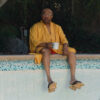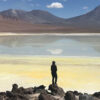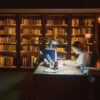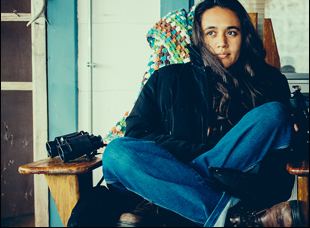If there was any wonder about why Haroula Rose was the right person to adapt Bonnie Jo Campbell’s ‘70s set coming-of-age tale “Once Upon a River,” it would be quickly dismissed after realizing the director would tackle a film version with the same sense of ferocity and fearlessness as its lead character Margo approaches life.
“I did all the things you’re not supposed to do,” laughs Rose. “It’s a period piece and there’s sex scenes and boats and water and guns and lots of difficult things, but I felt very called to tell this story and I learned so much.”
Admittedly, Rose required less of an education than Margo does, perhaps making her feature directorial debut with “Once Upon a River,” but bringing to bear her experience as both a filmmaker and a musician to the story of the young woman (Kenadi DelaCerna) from Murrayville, Michigan who leaves the only place she knows in the wake of a scandal to track down her mother (Lindsay Pulsipher), who abandoned her as a child. As Margo finds the best way forward is by paddling down the Stark River, Rose elegantly brings out the notion that the emotional terrain Margo must navigate within her own soul may be even more treacherous than the harsh rural landscape she traverses, though for as many strangers as she comes across and shouldn’t trust, she finds more than a few who nudge her towards being able to place her faith in others once again, namely a kindly trailer park dweller named Smoke (John Ashton), after depending on herself for so long that she’s closed off to the outside world.
Margo may come from a rough and tumble life, but Rose lets “Once Upon a River” unfold with a gentle spirit and often taking the path less traveled at any forks in the tributary, deeply compassionate towards the hard choices that its characters make for their own well-being and taking into account the reality of difficult situations in ways you rarely see onscreen. After making its premiere earlier this year at the Bentonville Film Festival, Rose brought the film to her hometown of Chicago where it will have two encore screenings this weekend following its premiere earlier this week and in the midst of a busy time for the filmmaker, she was gracious enough to talk about the rare occurrence of a first-time filmmaker taking on an literary adaptation independently, nearly having to put the project on the shelf when she couldn’t find the right lead actress and what it was like showing the film to Campbell for the first time.
I keep getting asked this question [of] how did I find the book, and I’ve started saying the book kind of found me because I do think there’s a mystical energy to what Bonnie Jo Campbell carries with her in the way that she writes and the stories and characters she creates. When I read the blurb about what [“Once Upon a River”] was about in this magazine, I thought this is a world and a character I don’t see often in books and felt like it would be cinematic. And then I read the book and I contacted Bonni Jo and she said, “If you want to write about the river, you’ve got to come up and meet me at the river.” So I did. She lives by the St. Joe River in Michigan and we started just finishing each other’s sentences about the character and this entire way of seeing this world. It just felt right and even though I was broke [and couldn’t afford to pay a lot for the rights], she trusted me as well and her agent had to trust that she trusted me, which was great.
Since coming-of-age stories are pretty accessible from personal experience, I imagine you could’ve pursued your own original narrative, but it must’ve been really important to you to tell this particular story.
Yeah, it was because [Bonnie Jo] covers a lot of ground in terms of the literal and the metaphorical and what it means to be American. It’s a complex story, but it’s not an issue movie, and it deals with a lot in a really subtle, artful way and it’s just about this character’s subjective experience. I loved that about it and that it’s an homage to Annie Oakley and Huck Finn and all these typically masculine young men in our lore of America, but I had never seen it being a woman, especially one who’s curious in her way and almost part feral. I fell in love with that idea of this quiet but mysterious heroine.
This may have been inherent to the novel, but I was impressed that a lot of situations that women would be vilified for – the decision of the mother to leave her family for her own well-being and some of the choices Margo makes – are treated without judgment here. Were you conscious of that or did it come naturally?
I really love when, as a viewer, you are asked to call upon some deeper grey area feelings, and when we’re not judging our fellow man or woman. The mother is very flawed, and even though obviously some people will call her a monster, she is doing her best. I don’t like it when things are spelled out about how to feel because I don’t think anyone is truly a villain and I really like it when stories leave that open for people to then have a conversation. When I went to Bonni’s house, we [also] had this very similar objective of not making it seems like Margo is a victim, but more of a survivor and [how] these things make her stronger instead of weaker. We just wanted to make sure that all these things that are typically viewed as masculine qualities are actually quite feminine as well and it was really cool.
Is it true your album “Here the Blue River” was actually a bit of a trial run in developing the film?
I wrote this song “Margo” [for it] because it takes a long time to get a movie made, and it’s nice to feel like you’re still engaging to the story and the character and the world, so I was playing with the idea of different sounds and instrumentation and the idea of this girl who’s alone on a journey, so I just wrote this song and the words tumbled out of me. I put it on this record and I just saw it as a really nice way again to converge some ways of storytelling — [for instance] I’m playing [the song] tonight at this bookstore and Bonni Jo’s going to read some passages from the book, and I really like doing these events with the author because she’s the one that made it all up. [And Bonni Jo will tell me] “Oh, you’re the one who had to find the people. You’re crazy. I just made it all up.” [laughs] But I just think there’s something so incredible when you can take a work of art, whatever the medium is and sort of transfer it or translate it into this other life.
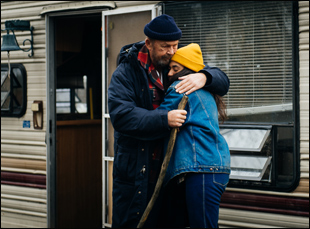
I had this amazing casting director, Angelique Midthunder, who helped me find Tatanka Means and Ajuawak Kapashesit, who played the other two Native American roles, and she sent me other young women, but none of them quite were right. Obviously, you have to really love [Margo] – she’s in every scene of it and you’re really in her head and in her experience. I just kept looking at videos and putting things on backstage.com and casting networks and it was very 11th hour — we were truly going to have to pull the plug on the whole thing and wait until spring because you could start to feel it get very cold in early October — then this woman who helped with production sent me this link and we found her. It was one of those miracles of movie magic. I flew to New York to do a screen test with [Kenadi] and to do a test some vintage lenses with Charlotte [Hornsby], my cinematographer, and it lined up where we could test out these lenses and see Kenadi in person. She just had all the right qualities where she’s really innocent and wild and curious and also it was her first film, so it all felt really organic. And it was crazy because the very day after we wrapped, it snowed two feet, so my weird, witchy instincts, like “If we don’t find her in the next day or two” were right. [laughs]
Did the weather cooperate? It looks beautiful on screen.
Mostly I’ll say yes because it could’ve been worse, but it was really difficult. Some days, especially the day with the lovemaking scene was truly one of the coldest of the year and I felt bad for [the actors]. We had heat lamps and did everything we could, but it’s really cold out there and by the water, it got even colder. We all wore a lot of layers and got used to it. My skin got thicker. [laughs]
Were there things you might not have been anticipating that you now really like about the film?
Yeah, every day you come in with ideas and things are prepared and you just see what unfolds and feels authentic. There were times where the blocking might not work and we would adjust it and I always say this about directing – you’re obviously clear about what you want and what you’re saying, but the ability to be flexible and to be open to what feels authentic in the moment is extremely important as well. I feel like we had that daily because John Ashton is such a tremendous actor and he just would nail it on every take and be very authentic and get this variety sometimes from Kenadi, and it worked really well in the edit to have those options. Having someone who’s done a hundred movies and is in their 70s and a girl who it’s her first film, that chemistry was really special and whenever I watch it, I feel that played a part.
I loved the moment when John Ashton starts singing. What was it like to get him to do that?
I wanted to make sure that there’s some kind of history to his character and [since] I’m a musician, I thought it would be great to have an original song to go with the film. We ended up having a bunch from really incredible artists like Rodney Crowell — JD Souther wrote that song — and Bonnie Prince Billy wrote a couple and I co-wrote the ending one with my friend Peter Bradley Adams, but I just thought it would be lovely to have a scene where it’s almost like confessional.
John’s not a singer, so it was pretty adorable seeing him walk around set behind the scenes with his earbuds in, listening to the song, learning the words and singing it. He’s such a tremendous person and his range as an actor is so vast that he can play funny and vulnerable simultaneously, so I knew he would nail it. He was really nervous about it, but he’s [also] a drummer — he knows how to play music, but just not sing — and I thought he did such a good job.
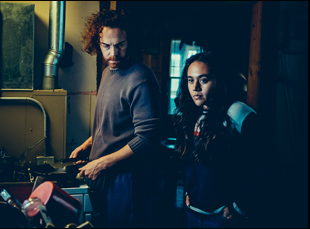
I’ll have you know that I was really nervous that no one would show up [for the first screening] because it was rainy and cold at 2 o’clock on a Monday, but I almost cried when I walked in and it was a very full theater. I was just so moved by this because it means people actually care and seeing them get emotional and laugh and cry was a really cool feeling. Friday and Saturday will be when a lot of the local cast and crew get to see it and that’ll be amazing too — the people who let us use their homes up in Antioch are going to come, so I’m just really happy when we get to share it with everyone who helped us because a lot of people were very generous.
Bonnie Jo must like the film since she joined you for the screening Monday. What was it like screening it for her the first time?
Oh wow. I worked on the script for a while and I was nervous to show her the script once I finally pared it down. Adapting a book is deceptively hard because you have to collapse time into 90 to 100 pages, and the book takes place over two years and it was a trip trying to figure out what to cut [because] you don’t want to be repetitive and you don’t want to waste time. So I told Bonnie Jo it was going to be different and she was very respectful. She’s like, “A book is a book. A movie is a movie. I respect that it’s different and you’ve got to do your thing.” And I’ve heard other experiences that aren’t that way, but I sent her the script and she liked it and she said, “Cool,” and blessed it. So showing her the movie, I sent her a link and she just called me right away. She had been in tears and couldn’t believe it. And every time she sees it, she says, “Now I start to see your movie every time I’m thinking of my book,” and it’s so lovely. She’s just been amazing to collaborate with and I think we’re working on something else together. I can’t wait because she’s so awesome.
“Once Upon a River” will be available in virtual cinemas starting October 2nd. A full list is here.
